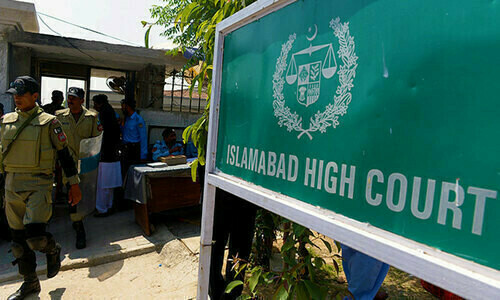APROPOS Asma Jahangir’s ‘A three-path judgement’ (Aug 31). She writes disparagingly of the decision of the Supreme Court to dismiss the legal challenges to the 21st Amendment pointing out a trichotomy of thought in the landmark judgement.
The learned human rights activist has perhaps forgotten about the Diplock courts during the Irish insurgency that were instituted by a country whose constitutional traditions we follow.
Having become tired of the rising tide of IRA terrorism and the wave of attacks on the police, paramilitary and the army, the British government resorted to the establishment of these courts to mete out quick justice to the terrorists. The measure ultimately led to peace parleys and the Good Friday Agreement.
This attitude will do no service to an already bludgeoned nation that lay prostrate only a few months ago in front of the terrorists’ bestiality.
The military courts far from being a permanent encroachment are meant to root out crime and make citizens safe. Rooting for turf privileges at a time of clear and present danger to national survival is tantamount to suicide.
Brig(r) Raashid Wali Janjua
Rawalpindi
(2)
MEDIAEVAL jurists advanced extra-legal actions of state actors by citing that which is otherwise not lawful. Chief Justice Munir invoked the ‘doctrine of necessity’ and validated the dissolution of the Constituent Assembly.
The ruling elite has been the beneficiary of such an infamous doctrine. Asma Jahangir in her atrticle ‘A three-path judgement’(Aug 31) admitted: the SC judgement was “a reminder of the several compromises that have been made by Pakistan’s judiciary over the years.”
Jurists almost abandoned the rule of law, and corruption penetrated deep, spear-headed by the ruling elite. Merit, accountability and ethical values are now almost non-existent.
Strengthened by the doctrine of necessity, rulers weakened state institutions to such an extent that mega corruption cases against the well-known seem to be at a standstill.
Similarly, despite flagrant irregularities committed by Election Commission officials during the 2013 election, there is no remorse and resignation by them.
Indeed, necessity has become the mother of all sins, as widespread social injustice is pulling back our country from advancing to a prosperous future. The judiciary , enjoying millions of rupees every month from taxpayers’ money, has much to atone.
People have a right to ask: “When will the curse of necessity stop sinning against the people?”
Wg-Cdr (r) Mushtaq Ahmed
Doha , Qatar
Published in Dawn, September 2nd, 2015
On a mobile phone? Get the Dawn Mobile App: Apple Store | Google Play













































Dear visitor, the comments section is undergoing an overhaul and will return soon.